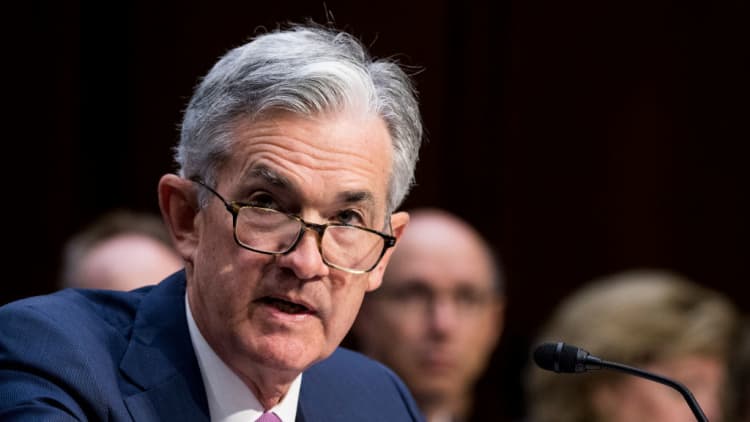
The U.S. economy remains strong, but dangers are brewing, Federal Reserve Chairman Jerome Powell told a Senate committee Tuesday.
In his semiannual testimony on the state of monetary policy, the central bank chief noted that the Fed is watching the state of affairs closely and is prepared to adapt policy if warranted. In all, he called the U.S. economic outlook "generally favorable" but one that faces challenges from abroad.
"While we view current economic conditions as healthy and the economic outlook as favorable, over the past few months we have seen some crosscurrents and conflicting signals," Powell said in his prepared remarks to the Senate Committee on Banking, Housing and Urban Affairs. "Financial markets became more volatile toward year-end, and financial conditions are now less supportive of growth than they were earlier last year."
China and Europe are particular areas of concern, and the Fed is watching how Brexit negotiations and trade talks play out.
"We will carefully monitor these issues as they evolve," Powell said.
The Fed has been caught in a market crossfire in the past several months, triggered by worries that it was on a set policy path and would continue tightening even if conditions weakened. More recently, though, officials have been conveying a message of patience with the future policy path, including both the approach to interest rates and to reducing the bonds the Fed holds on its balance sheet.
'Prepared to adjust'
Powell rattled investors in December when he described the balance sheet roll-off as being on "autopilot," but his remarks Tuesday represented a different tack.
"I would note that we are prepared to adjust any of the details for completing balance sheet normalization in light of economic and financial developments. In the longer run, the size of the balance sheet will be determined by the demand for Federal Reserve liabilities such as currency and bank reserves," he said.
The Fed's balance sheet, composed mostly of Treasurys and mortgage-backed securities it bought in an effort to lower long-term interest rates and stimulate growth, swelled to $4.5 trillion but is now down to about $4 trillion due to the reduction process. Up to $50 billion a month in proceeds is being allowed to roll off, with the rest being reinvested.
While Fed officials expected the process to run smoothly, it began to attract market concern as financial conditions weakened in the fourth quarter.
For the first time, Powell put an estimate on where bank reserves would end up before the Fed puts a halt to the roll-off. He said the likely level is around $1 trillion "plus a buffer," a number he said "is a reasonable starting point." Reserves are currently just over $1.6 trillion, so Powell's figures reaffirm consensus that the unwind will end by around the end of 2019.
Sen. Mike Crapo, the Idaho Republican who chairs the committee, said in a statement that he "has long been concerned" about the Fed's stimulus programs and is looking for clarity on what the ultimate size of the balance sheet will be, among other concerns.
In addition to policy, Powell also addressed several other economic issues, in particular the continued low levels of inflation, currently running below the Fed's 2 percent target, as well as weak productivity and public debt, which he said is "on an unsustainable path."
Among positive developments, he cited stronger wage growth, especially among lower earners, as well as increased labor force participation.
Powell will speak to the House Financial Services Committee on Wednesday.


